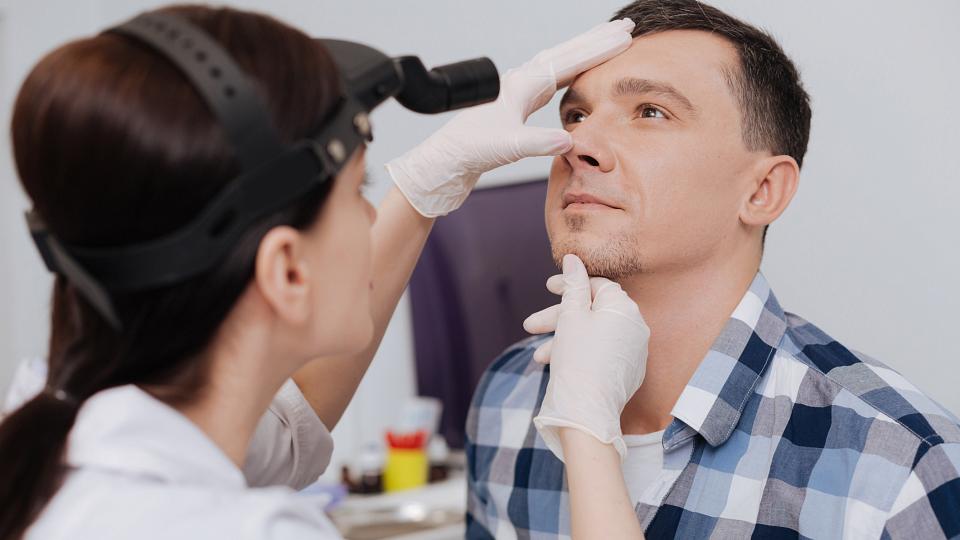
Finding the Best Rhinoplasty Surgeon for You
Whether you are considering rhinoplasty for cosmetic or medical reasons, such as a deviated septum, cleft palate, or abnormalities due to injury or trauma, you want to feel confident and comfortable talking to your surgeon.
Patients should visit multiple plastic surgeons before making a decision about who should perform their rhinoplasty.
“There is not a set way to do every operation, and every rhinoplasty is highly individualized,” says Cori Agarwal, MD, a board-certified plastic surgeon at University of Utah Health. “It’s important to feel comfortable with the surgeon—that they are listening to your needs and understanding what you are asking for.”
Before deciding which surgeons to consider, do a little homework regarding their practices. Consider these important steps:
1. Determine if the surgeon is board-certified and if they are experienced in performing rhinoplasties
The board certification can be awarded by either the American Board of Plastic Surgery or the American Board of Facial Plastic and Reconstructive Surgery. These certifications mean that your plastic surgeon has undergone appropriate residency training and has completed a written and oral exam testing procedural knowledge.
If the surgeon’s experience with rhinoplasty isn’t clear on their website or from their credentials, Agarwal says to ask questions, such as these, directly:
- How much of your practice is dedicated to rhinoplasties?
- How many rhinoplasty surgeries do you perform in a year?
- Will you feel comfortable doing my surgery?
- Do you think you can deliver the results that I’m looking for?
“This can be an especially important question if you have a complicated problem, such as having had multiple prior operations or a really bad accident,” Agarwal says. “Some surgeons may be comfortable with performing straightforward ‘primary’ rhinoplasties but may not be comfortable performing a more complex rhinoplasty. In those cases, the surgeon may refer you to someone else.”
2. Reputation of the surgeon is important
You can ask others you know who have had a rhinoplasty about their experience, or you can even ask the surgeon if they have past patients who might be willing to speak with you. Online ratings and reviews are also helpful, but Agarwal warns that sometimes patients with negative experiences are more apt to provide ratings and reviews, so they may be skewed.
3. Safety of the hospital and the plan for anesthesia is also important
The surgeon will ask you about your health, your past medical history, and your experience with past operations. It is critical that you are at your best health and that any medical problems such as diabetes or hypertension are well controlled.
4. Visualize your results
Before and after photographs can be a good tool for seeing the results of a particular surgeon’s work if they are available. Some offices, however, may not have the photos available due to privacy or policy issues.
If these photos are not available online, Agarwal says that when you go in for your consultation, you should ask if they have examples to show you or if they can illustrate what their vision is for your outcome. That could be through drawings, looking at photos of similar noses, looking in the mirror together, or doing some digital simulations.

“Essentially, it is important that you feel your surgeon knows what you are looking for in the final shape of your nose and you can find a way to illustrate that to each other."
So, How Did Your Meeting Go?
After visiting with a surgeon but before you make your decision, you may want to ask yourself these questions:
- Did the surgeon make you feel at ease?
- Did the surgeon listen to your concerns and offer feedback?
- Did the surgeon understand your expectations and desired outcome?
- Did the surgeon help you understand all your options?
- Did they provide good information about what to expect during surgery and recovery?
- Were you reassured about the safety of the surgery?
- Was the office professional, clean, and welcoming?
- Did you feel comfortable with the office and nursing staff?
Ultimately, it is important to do your research and make sure that the surgeon is well qualified in rhinoplasty. It may help to meet with several surgeons to find the best “fit” for your personality and goals. If your answers to the questions above are positive, the surgeon is board-certified, and they have verified rhinoplasty experience, then you may have found a surgeon who is right for you.

